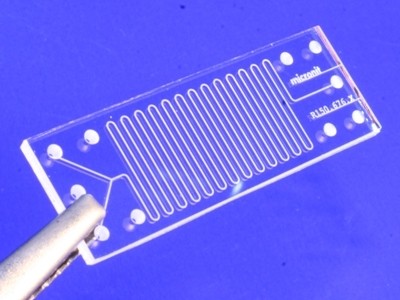Researchers from Tel Aviv University have brought about a huge, and humane, breakthrough in the detection of pollutants

For hundreds of years, EPA has been our first line of defense against toxins. The canary bird in the coal mines was used by us in live monitoring of toxic gases. Scientists have used fish to detect contaminants in our drinking water. Even with current developments, however, it can be days before a chemical or organism that is fatal to humans is identified with certainty.
So far. In their activity in the miniaturized world of nanotechnology, researchers from Tel Aviv University in Israel have brought about a huge, and humane, breakthrough in the detection of pollutants.
A research group headed by Prof. Yossi Shacham-Diamand (Shacham-Diamand), the vice dean of the Faculty of Engineering at the university, has developed a nanometric "laboratory" that incorporates a microscopic workbench to measure water quality in real time. Their "lab on a chip" is a breakthrough in the ongoing effort to protect our drinking water from infections and bioterrorist risks in their biology stage with the most advanced capabilities of the science of nanotechnology.
"We developed a template - mainly on a micron scale, of a "laboratory" measuring about sixty square centimeters that uses a genetically modified bacterium that glows when the water is polluted," says the researcher. On the tiny chip is placed equipment that helps detect low levels of light produced by the bacteria.
Instead of using the BAH to help identify risks to the water supply, says the researcher, "Our system is based on a plastic chip, a more humane idea, which is fast, sensitive and much cheaper."
"Basically, our system is an innovative advance in the system of a "lab on a chip", the researcher points out. "This is an ingenious nanopattern designed to receive information from biological events. Our solution is able to monitor water quality with levels of accuracy that have never existed before. However, since the solution is a template, it can also be used for other purposes, unlimited in number, such as: research into healing using stem cells or treatments against cancer."
According to published professional literature, Tel Aviv University is one of the five most pioneering universities in the world in using the scientific idea of a "lab on a chip". The nanolaboratories can be used to examine several biological processes with practical applications such as: the presence of bacteria in water, the study of stem cell activity or the development of breast cancer.
Professor Shaham-Diamond's active research group publishes a respected article in this field about once a month, most recently in the scientific journal Nano Letters.
In collaboration with other Israeli scientists, Tel Aviv University is currently producing and commercializing its water testing nanolaboratories to measure and monitor the response of a genetically modified bacterium to various water infections, such as Escherichia coli. Various cities throughout Israel have already expressed interest in the new technology, as has the state of Hawaii in the USA.

5 תגובות
According to the original article in English the lab is much smaller.
It says quarter inch square
Eyal
The chip is 60 cmXNUMX and the laboratory and all the tools with which they work on the chip are nanometers.
It might be cheap to produce, but as you know, they inflate the price until the patents drop (and that's why they take longer and longer to drop despite the fast pace of change in technology today)
In any case, it would indeed be very good to know in real time what is happening in our body, think about it, there is no need to be paranoid or wait until the disease has almost finished its work.
60 square centimeters?…
wow It's amazing, and to think that our own scientists developed this lab.
This whole issue of being able to do everything in a small (very small) way: a small laboratory, small calculations, in general all the possibilities that exist is simply genius.